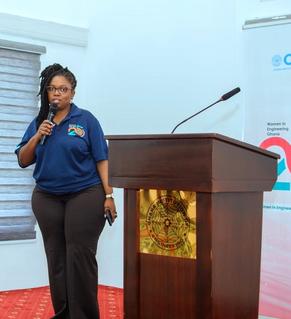Profile
- Name:
Dr Araba Amo-Aidoo
- Professional background:
PhD in Agricultural Engineering
- Place of assignment:
Ghana Institution of Engineering (GhIE) – Women in Engineering, Ghana
- Duration of assignment:
2 weeks

Early in her career, Dr Araba Amo-Aidoo was the only woman in a team of seven engineers. She experienced a sense of isolation that went far beyond the professional: even the office facilities weren’t designed with women in mind, there were, for instance, no separate toilets. To her, this was more than a daily inconvenience, it was clear proof that women were still not considered in technical professions. “We often feel excluded in science and technology, especially in fields like engineering, which seem dominated by men,” Dr Amo-Aidoo reflects. This experience sharpened her awareness of the structural barriers women face in the world of technology. Determined to make a difference, she set out to empower young girls, especially those just beginning their education, to claim their place in the world of engineering with confidence.
In Ghana, the proportion of women in engineering is only about ten percent, despite women making up half of the population. This significant underrepresentation stems from gender stereotypes, a lack of female role models and financial barriers, including the gender pay gap in the sector. In response to this issue, the Ghana Institution of Engineering (GhIE) launched the Women in Engineering (WinE) initiative in 1999 with the goal of inspiring young women and girls to pursue careers in technical fields.
In March 2024, WinE celebrated its 25th anniversary by organising mentorship and capacity-building events to increase female representation in engineering. To reach as many interested participants as possible, WinE sought an engineer with international experience who could share her expertise and insights, as well as guide the events. Supported by GIZ’s Diaspora Experts initiative, Dr Amo-Aidoo returned to Ghana for two weeks to contribute her expertise. With her extensive experience in renewable energy projects, policy development and consultancy, including work with the World Bank, she brought both knowledge and a passion for gender equality. Her return marked the completion of a full circle: years earlier, she had contributed to the development of the "Catch them Young" initiative, which aims to inspire girls from primary school through to university to pursue careers in technical fields. Looking back, she said: “Returning to my home country to witness the growth of the initiative I started was unforgettable.”
New Perspectives
Through social media and in-person mentorship campaigns, Dr Amo-Aidoo and the WinE team reached thousands of students during the course of the 25th anniversary campaigns. The aim was to challenge stereotypes, highlight real examples of female engineers and offer personal mentoring. In workshops led by Dr Amo-Aidoo and 25 mentors from various organisations, including the Ghana Navy and MTN, the girls gained valuable insights into the opportunities available in technical professions. The mentors shared their career development journeys, discussing the challenges they faced and their successes. The mentoring took place across the country, from the capital, Accra, to Bolgatanga in the Upper East Region, ensuring that location was not a discriminatory factor.
Subsequently, many girls began to see themselves in laboratories and technical professions, rather than only in the roles traditionally assigned to them by societal norms. The visibility of successful female engineers, combined with targeted mentoring, led to a noticeable increase in interest in STEM subjects. WinE has since established long-term mentoring programmes and local support networks to sustain this momentum.
Further information on the offers available to the Ghanaian diaspora can be found below.